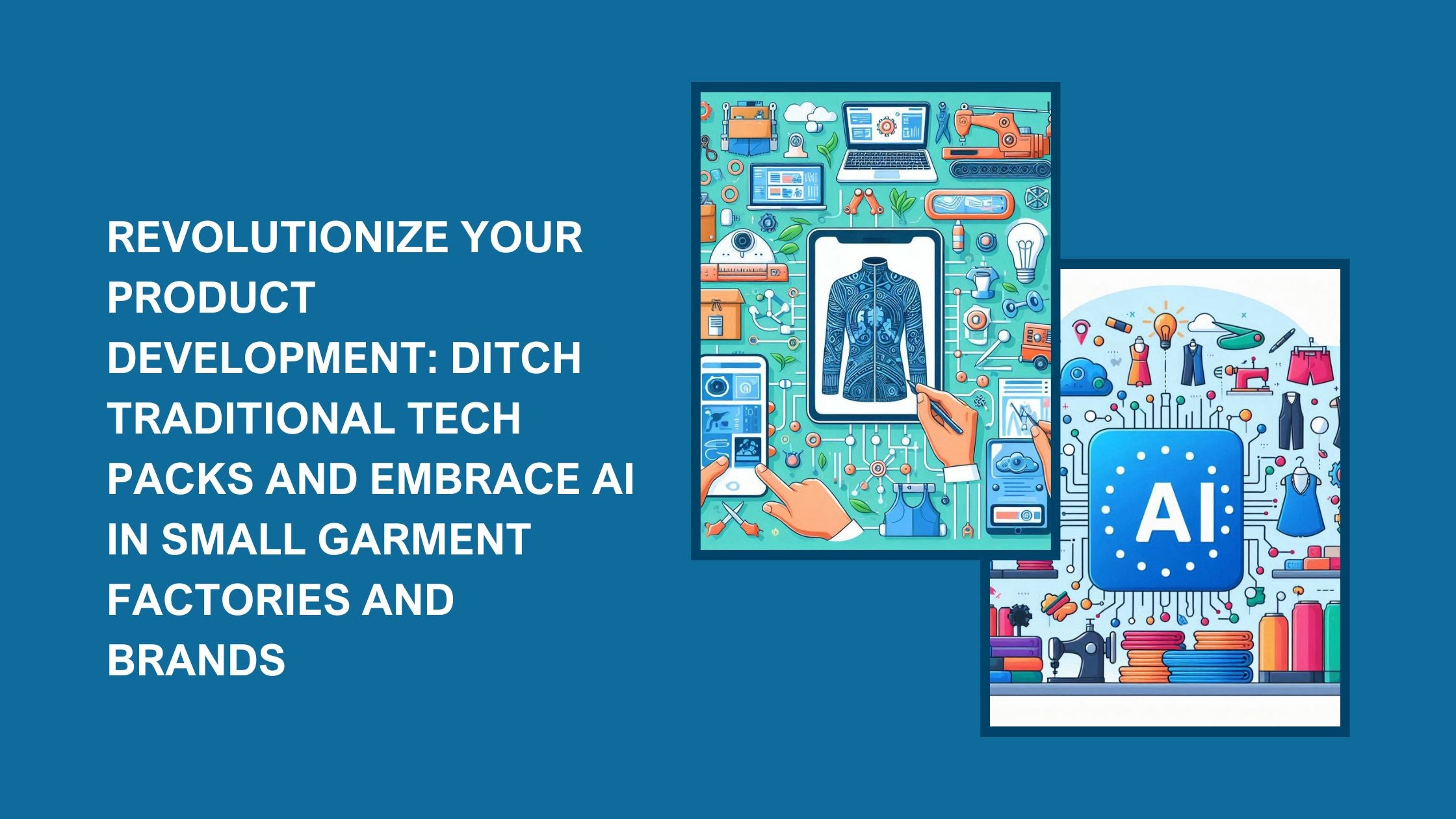Revolutionize Your Product Development: Ditch Traditional Tech Packs and Embrace AI in Small Garment Factories and Brands
| Oct, 01 , 24
Are traditional tech packs holding your garment production back? Does your team still rely on static PDF documents to guide product development? You might face delays, miscommunication, and inefficiencies that slow you down in our fast-paced garment landscape.
Tech packs have long been the foundation of garment production, outlining essential design and manufacturing specifications. However, traditional tech packs are becoming obsolete in a world that demands faster, more flexible, and highly collaborative processes. The rigidity of static documents no longer aligns with the dynamic needs of modern brands and small garment factories. The global garment industry is evolving. Production processes must evolve to keep pace.
We explore how AI-powered, agile tech packs can revolutionize product development for small garment factories and brands. By adopting these innovative tools, businesses can overcome the limitations of traditional tech packs, streamline collaboration, and achieve faster time-to-market, all while improving product quality. Before we dive in, let us provide you with a few intriguing stats.
Impact of AI-Powered Tech Packs:
- Reduced time-to-market by 20-30% through streamlined collaboration and fewer errors (Source: McKinsey & Company).
- Improved product quality by 15-20% thanks to enhanced communication and reduced miscommunication (Source: Deloitte).
- Increased efficiency and productivity by 25-30% due to automated workflows and real-time updates (Source: Forrester).
In the sections ahead, we will discuss how AI-driven tech packs can transform your approach to garment production, offering both short- and long-term benefits for your brand.
Once the lifeline of the garment industry, traditional tech packs do not hold much value in our modern production age.

Why Traditional Tech Packs Do Not Work Anymore in Small Garment Factories and Brands
Static Nature of Tech Packs
Traditional tech packs, usually created as static PDFs, present significant challenges for small garment factories and brands. These documents do not support real-time updates, meaning any design change or adjustment requires generating and sharing a new version. This process often results in delays, confusion, and a higher likelihood of errors, as old versions of tech packs may continue to circulate. For small garment brands, which need to remain agile and responsive, this slow update process hampers efficiency and disrupts workflows.
Lack of Accessibility
Design and production teams are at different locations in the garment industry. It makes accessibility a vital issue. Traditional tech packs are typically stored on individual computers or shared through email, creating version control problems. When multiple versions of tech packs circulate, it can lead to confusion over which is the latest or most accurate, creating bottlenecks that slow down the entire product development process.
Incohesive Data
The fragmented nature of traditional tech packs causes inefficiency and communication breakdowns. Data related to designs, material specifications, and production details are across email, spreadsheets, and folders, with different departments working in silos. It leads to mistakes, duplication of efforts, and wasted time to locate the most up-to-date information. For small factories, these inefficiencies can result in costly delays, missed opportunities, and product quality issues.
Inefficient Collaboration
Small garment factories thrive on agility, but traditional tech packs hinder the collaborative processes necessary for success. Teams struggle to collaborate efficiently with no real-time interaction or integrated communication features. Feedback loops are slow, and when changed, it often takes days for the updated information to reach all relevant team members. This lack of instant collaboration decreases team productivity and delays project completion.
Now you know the issues. Let us go into the solution.

How AI-Powered Tech Packs are Revolutionizing Product Development in Small Garment Factories and Brands
AI for Real-Time Collaboration
Single-Page, Real-Time Collaboration:
AI-driven platforms are transforming how small garment factories approach tech packs by offering single-page, real-time collaboration tools. With everyone working on the same platform, teams can see updates immediately and communicate seamlessly across departments. This feature eliminates the need for multiple document versions and speeds up the entire development process.
Instant Communication and Feedback:
Built-in AI communication tools provide real-time updates and feedback loops. All stakeholders can receive instant notifications, whether a change in design, materials, or production details. It reduces delays, enables faster decision-making, and ensures everyone remains on the same page throughout the product lifecycle.
AI-Enhanced Data Accessibility
Centralized Data Hub:
AI-powered tech packs use a centralized hub where all design and production data are stored. It makes it easier for teams to access the most up-to-date information, ensuring consistent and accurate communication between departments. The centralized platform simplifies data management and improves overall workflow efficiency, a crucial benefit for small garment factories that need to optimize resources.
AI-Powered Design Flexibility
Dynamic Updates and Iteration:
With AI-driven tools, designers and production teams can quickly adjust specifications, materials, and production instructions on the fly. This flexibility allows small garment brands to remain responsive to customer demands or market trends without the delays associated with traditional tech packs. Quick iteration means teams can experiment with different materials or designs without being bogged down by the time-consuming process of creating new static documents.
Seamless Integration with Other Tools
Integrating CAD, Inventory, and Supply Chain Systems:
AI-powered platforms seamlessly integrate with other essential tools in the garment industry, such as CAD software, inventory management systems, and supply chain platforms. These integrations allow small garment factories to streamline workflows, reduce manual data entry, and improve connectivity across the production process. The enhanced efficiency ensures that designs can move quickly from concept to production with minimal friction.

Benefits of AI-Driven, Interactive Tech Packs in Small Garment Factories and Brands
Faster Time to Market
AI-powered tools significantly accelerate product development by enabling real-time collaboration and instant updates. It allows small garment factories to reduce the time between design and production, leading to faster time-to-market and the ability to capitalize on trends more effectively.
Reduced Errors and Waste
By centralizing data and facilitating real-time communication, AI tech packs reduce the risk of miscommunication between teams. Fewer errors mean less wasted material and resources, leading to more sustainable production processes and improved profitability.
Better Collaboration Across Teams
AI tools enable more cohesive collaboration between design, production, sourcing, and sales teams. Real-time updates ensure everyone gets the latest information, helping small factories maintain alignment and work more effectively together.
Greater Customization and Flexibility
The flexibility of AI-powered tech packs allows small garment brands to offer more personalized and customized products, meeting the growing demand for tailored fashion. This ability to quickly adjust designs and materials enhances customer satisfaction and loyalty.

The Need for Agile, Interactive Tech Packs in Small Garment Factories
Keeping Up with Industry Demands
The industry is evolving rapidly, and small garment factories must adopt modern tech packs to stay competitive. Static, outdated systems are no longer sufficient. Agile, AI-powered tech packs are vital to keeping up with fast-changing trends and customer demands.
Adaptation to Market Trends
AI-powered tech packs provide the agility to quickly adapt to market shifts, allowing small factories to release products that resonate with consumers. The ability to pivot in real time ensures that brands stay relevant and ahead of the competition.
AI as the Key to Future Success
Embracing AI in product development is essential for the long-term success of small garment factories and brands. Small businesses can streamline processes, improve efficiency, and position themselves for future growth and innovation by ditching traditional tech packs and embracing AI-powered, interactive systems.

Revolutionize Your Product Development with EverLighten
At EverLighten, we understand the challenges small garment factories and brands face in today’s fast-paced industry. That’s why we’re committed to helping you stay ahead of the competition with innovative, AI-powered garment solutions. Whether you want, EverLighten is here to help.
Why choose EverLighten?
- 100% Customization: Tailor your product exactly as you envision it.
- 100% Quality Check: We ensure every detail is perfect before production.
- Free Design Help: Our expert team will assist you at every stage.
- Worldwide Delivery: No matter where you are, we’ve got you covered.
- 24/7 Support: Always here to assist you.
- Unlimited Revisions: Your satisfaction is our priority.
- Low MOQ: Start your production with a low minimum order quantity.
Ready to take your garment production to the next level? Contact EverLighten today and experience the future of product development.
FAQs
- Why are traditional tech packs inefficient?
Traditional tech packs are static documents that can’t be updated in real-time, causing delays, version control issues, and miscommunication. It leads to inefficiencies and slows down the product development process.
- How does AI improve tech packs for small garment factories?
AI allows real-time collaboration, centralized data, and seamless communication across departments. It improves efficiency, reduces errors, and enables faster decision-making, helping small garment factories stay competitive.
- Can small factories afford AI-driven tech pack solutions?
Yes, there are scalable and affordable AI solutions that cater to the needs and budgets of small garment factories and brands. These solutions provide value without requiring massive upfront investments.
- How do AI-driven tech packs integrate with other tools?
Modern tech packs integrate seamlessly with tools like CAD software, inventory management systems, and supply chain platforms. It streamlines the design and production process, enhancing workflow efficiency and connectivity.
- What’s the main benefit of AI-powered tech packs?
AI-driven tech packs enhance collaboration, reduce errors, and are flexible and efficient. It helps brands stay competitive by improving the speed and quality of their product offerings.

